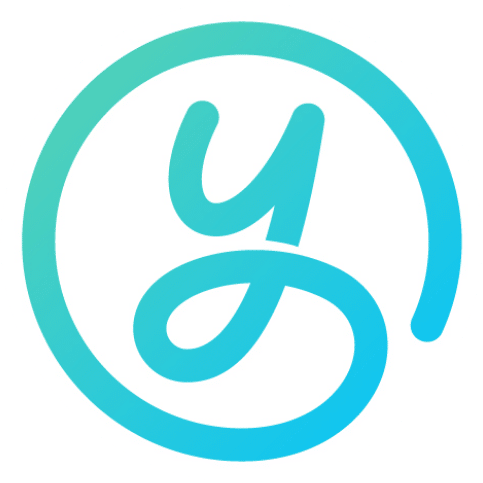If you are looking for guidance on the UBC Sauder Commerce (BCom) application, including Personal Profile examples and video interview questions prep, then you’ve come to the right place.
This Application Prep guide is fully updated with the 2024/2025 application (i.e. for applicants planning on starting the program in Fall 2025).
Before you dive in, it’s important to understand that the admissions committee receives thousands of applications every year. To help set yourself apart from the crowd, you need to demonstrate a clear sense of self, strong life experience, and exemplary communication skills.
Our ‘full student’ coaching process does exactly that. If you’re not working with a coach, be sure to read the Self-Awareness, Goal-Setting, and Narrative Communication Skills Guides.
The Narrative Communication Approach™ is a particularly useful storytelling framework that helps you tell a clear and concise story, while creating an emotional connection with the reader. All UBC Sauder BCom essay examples and templates use this approach (access your UBC Sauder Commerce Personal Profile template here).
We’ve also created a comprehensive Interview Skills Guide that covers every step of the interview process so you can ace any question that comes your way. Check it out before getting started!
If you’re serious about getting into UBC Sauder School of Business and reaching your fullest post-secondary potential, read our UBC Commerce Program Guide and connect with a Youth Coach. It’s never too early to receive coaching.
Table of Contents
- 2024/2025 UBC Sauder Application: Personal Profile overview; Question templates and examples; Interview prep and possible questions; and More.
- 2021/2022 UBC Sauder Application: Personal profile questions and overview; Essay templates and examples; Interview prep; and More.
2024/2025 UBC Sauder Commerce Application
The UBC Sauder Application has 2 components (keep reading for a full breakdown of each part):
- Personal Profile: A series of experience/interest questions as well as a ‘resume’ style list of activities/accomplishments and the contact info for two references.
- Timed Video Responses: 2 randomly generated video interview questions.
REMEMBER: The application for UBC Sauder BCom must be submitted by January 15, 2025 at 11:59pm PST (the deadline to be considered for most entrance awards is December 1, 2024).
The entire application must be submitted through a platform called EducationPlannerBC. You will find the place to put your Personal Profile Answers in the “Additional Information” tab of your EducationPlannerBC application. Simply write your answers to the questions in a separate doc (use our template here!) and then copy and paste your answers for each question.where you will write your Personal Profile.
The video responses are completed through a third-party site. Once you have recorded your responses, you will copy and paste the confirmation URL from this third-part site into your EducationPlannerBC application. Questions? We got you! Connect with a coach for support now.
The admissions committee evaluates your entire online application as well as your academic performance, using this breakdown:
- 30%: Personal Profile
- 20%: Video Interview
- 50%: Grades
Based on this evaluation, your Personal Profile and video interview account for 50% of your overall evaluation. That’s A LOT, making these app components the difference maker for your acceptance or rejection from the program.
Since your grades can only get you so far, you need to spend extra time thinking about and preparing your Personal Profile and video interview responses, and finding unique and memorable ways to showcase your experiences, interests, leadership potential, and suitability to the UBC Sauder BCom program. Think of these as your chance to make a great first impression.
This is exactly why we created this App Guide — to help you write the best essays and prepare you for your video interview so you can stand out from the crowd.
Keep reading for UBC Sauder Personal Profile examples and templates, as well as a breakdown of possible questions and tips to prepare the for video interview questions.
If you need help creating a unique and authentic application that will help you increase your chances of admission success, connect with a coach for 1-on-1 support.
UBC Commerce Application: Personal Profile – Overview
This is how the Personal Profile is broken down:
| # | Format | Word Count |
| Commerce-Specific Questions | ||
| 1 | Written | 500 words max |
| 2 | Written | 500 words max |
| General Questions for UBC Applicants | ||
| 3 | Written | 500 words max |
| 4 | Written | 500 words max |
| 5 | List with written responses | 500 words max (per activity) |
| 6 | Written | 500 words max |
| 7 | Written (optional) | 500 words max |
| 8 | References x 2 | n/a |
The written responses are focused on your experiences, leadership opportunities, interests, and more.
As mentioned above, your Personal Profile counts for 30% of your overall evaluation.
COACH’S TIP: Write your essay responses BEFORE you start your online application, so that you have time to rewrite, edit, and polish your answers. When you sign in, you will have to upload your answers immediately. Use this template to keep track of all your answers.
UBC Commerce Application: Personal Profile – Evaluation Rubric
We get a lot of questions about how the Personal Profile is evaluated.
Reviewers evaluate each essay in your Profile according to these 4 criteria:
- ENGAGEMENT AND ACCOMPLISHMENT:
Using specific examples, your answers should outline the activities, initiatives, causes, accomplishments, etc. that you’re most proud of and care most about, and the accomplishments you’ve had in those areas.
You should detail what you’ve learned because of these experiences, and how they’ve made you a better person both inside and outside the classroom.
Here are some things to think about to help you get started:
- What you care most about
- The people who are most important in your life
- How you manage your time and responsibilities
- Hobbies, volunteer work, or other interests you’re passionate about
- Community involvement and specific accomplishments you’ve achieved
- A goal or project you’ve set for yourself and achieved (and how you’ve done that)
- How you develop your passions and interests in various areas of your life
- LEADERSHIP:
Using specific examples, your answers should discuss experiences/accomplishments where you became a stronger leader and developed leadership skills, like responsibility, reliability, resourcefulness, time management, accountability, and initiative.
Leadership can come in many forms, so don’t feel intimidated if you haven’t had much experience with it. It can be something as simple as a group project where you took the lead, or an extracurricular activity where you stepped up and went above and beyond the call of duty.
Leadership can also be individual, like managing your own time or setting a specific challenge/goal for yourself and making a plan to achieve it.
Here are some things to think about to help you get started:
- A specific experience where you showed exceptional leadership (and how you managed it)
- What being a leader means to you
- How you handle responsibility and accountability
- How you use diverse opinions, experiences, and backgrounds to the advantage of the group you’re leading
- Effective strategies you’ve learned that help address specific challenges you’ve faced while leading
- How your activities and accomplishments have benefited your peers or community
- How have your leadership experiences influenced how you interact with others
- What are the lessons you’ve learned (including effective leadership strategies) that you will use in the future
You Might Also Like
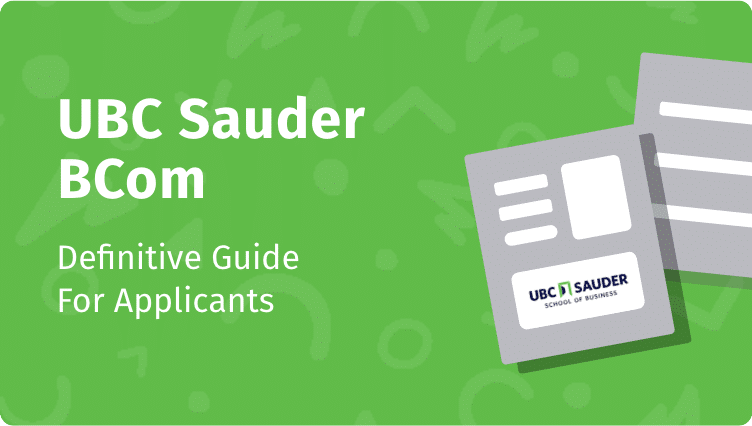
Program Guide
UBC Sauder School of Business BCom: A Definitive Guide for Applicants (2024)
This guide is for you if you’re thinking about applying to the Bachelor of Commerce (BCom) program at the UBC… Read more
- SUBSTANCE:
The evaluators want to see that EVERY example, detail, and learning outcome you write about in your answers has a purpose and is meaningful.
They want to see that you’ve really thought about your answers and taken the time to prepare them.
Uniqueness is a HUGE factor here — you don’t want your answers to be basic and the same as everyone else’s. They need to dig beyond the surface and give relevant and interesting insights that other students might not have thought of.
The evaluators also want to see that you’ve built self-awareness and have asked yourself big questions like who you are, what you value, where you want to go, and how you’ll apply the lessons you’ve learned to get there.
If you have filled out our Student Identity Blueprint then pulling out substance and deep personal insight in your essays will be a lot easier (if you haven’t filled out your Blueprint yet, click here to get started or connect with a coach).
- VOICE:
The evaluators want to see that you can communicate your ideas in an authentic and memorable way, using storytelling, emotional connection, and character development.
They want to see your personality and voice jump off the page — NOT the same generic essay over and over.
This might seem obvious, but a lot of students don’t know how to articulate their ideas in a genuine way that showcases who they are and explains what makes them different.
Once your Profile has been evaluated according to these criteria, it is compared with other students’ Personal Profiles. Then this score is applied to your overall admission average as well as other admission criteria (e.g. video interview), if applicable.
UBC SAUDER 2025 FALL APPLICATION
The UBC Commerce Personal Profile has 8 questions total (including optional questions and references), along with the video interview (which we will discuss more below).
Keep reading for a detailed breakdown of each, as well as examples and essay templates.
Don’t forget to check out our template for all these questions (just click File > Save a Copy).
2025 UBC Sauder Application: Personal Profile – Question 1 (Commerce-specific)
Explain how you responded to a problem and/or an unfamiliar situation. What did you do, what was the outcome, and what did you learn from the experience? (Maximum 500 words)
UBC Sauder Application: Personal Profile Question 1 – Breakdown
As the first question in your Personal Profile, this is where you have the opportunity to make a strong first impression.
This question prompts you to discuss a meaningful experience, where you were required to address a challenge or uncomfortable situation. The important thing here isn’t so much what the situation was, but how you handled adversity and what you learned from it.
Maybe you learned a new strategy for being a leader, or you saw the benefits of getting outside of your comfort zone, or you learned something about yourself.
Go beyond the surface and try to think of a problem/unfamiliar situation that will allow you to provide deep insight and self-awareness. Be as unique as possible, drawing out a learning outcome that is unexpected and memorable.
COACH’S TIP: Paint a vivid and detailed picture as much as possible, showing who you were before this problem and/or unfamiliar situation happened, and then what your initial reaction was, and how you resolved it. Let your personality shine through, while taking the reader on the journey with you.
Choose only experiences where you have a clear learning outcome that has changed who you are and how you view the world. You want to make sure that your answer has substance.
The reviewers want to see that you’ve really thought about why this learning outcome is important and how it can be applied to your life today (and in the future). If you can do this, we guarantee that your essay will stand out from other applicants.
Not sure how to communicate your personal growth and learning in essays like these? Our Narrative Communication Guide is a great place to start, and you can also connect with a coach to take your essay response to the next level.
UBC Sauder Application: Personal Profile Question 1 – Template
Get started on your template here (click File > Make a copy and save it to your computer).
REMEMBER: There is a 500 word limit for this answer.
We suggest following our Narrative Communication Approach.
UBC Sauder Application: Personal Profile Question 1 – Example
Here’s an example of how to answer this question.
REMEMBER: This is an EXAMPLE ONLY and is NOT meant for you to copy. Why? First and foremost, this is plagiarism and is a serious offense. Plagiarizing these essays will result in immediate disqualification from the admissions process. This can be easily detected using technology and application reviewers are usually trained and/or able to spot when an application isn’t original and does not align with an applicant’s background, personality, values, etc.
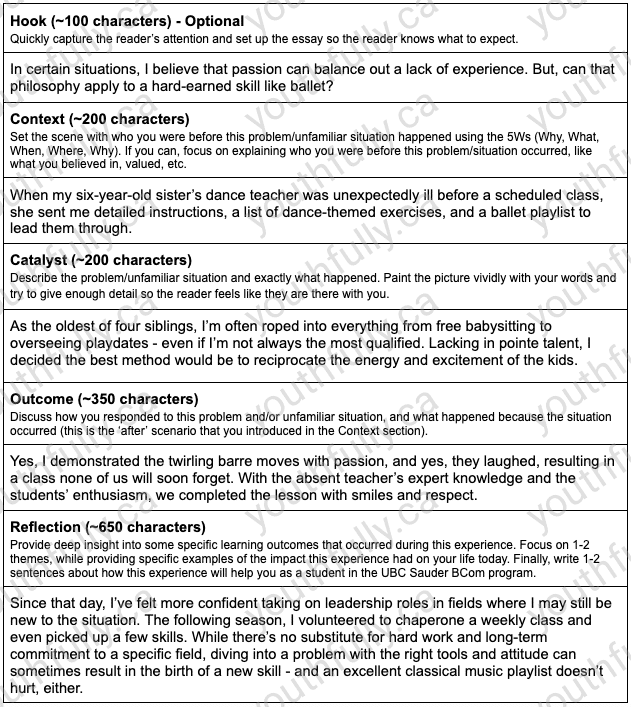
2025 UBC Sauder Application: Personal Profile – Question 2 (Commerce-specific)
We live in a global and diverse society. Explain how your community involvement prepares you for the future in this complex world. (Maximum 500 words)
UBC Sauder Application: Personal Profile Question 2 – Breakdown
Our society is by no means uniform — and that’s what makes it so amazing.
Whether you’re walking around downtown Toronto or taking a day trip to your favourite neighborhood in Vancouver, you’ll see people from all different backgrounds, cultures, religions, sexual orientations, economic standings, etc.
This is exactly what a ‘diverse society’, as outlined in this question, means. A diverse society is a society that’s made up of all types of people with different ethnicities, races, genders, languages, religions, etc., as well as in thought processes, opinions and ideas, life experiences, values, and more.
Diversity also extends far beyond your community or city.
When you scroll through Instagram or Tik Tok, you’ll see posts and videos of people from all around the world showcasing their unique culture, experiences, and interests. In this way, social media has created a ‘global society’ that connects us all. More than ever before, we have access to other ways of life, and this can help us learn, grow, and contribute to this connected society.
A key part of diversity is also inclusion, or accepting everyone’s differences and making an effort to ensure that each person is valued and respected for who they are.
Now that you have a good understanding of what this question means by a global and diverse society, try to think about some ways that you’ve seen diversity (and inclusion) in action.
During your extracurricular involvement in your community, you’ve undoubtedly come across all types of people with difference backgrounds, perspectives, experiences, culture, ideas, language, sexual orientations, etc. And you’ve probably had the chance to share yours as well.
When writing this essay, we recommend choosing one extracurricular experience you had in your community within the last couple of years, when you worked or interacted with a diverse group of people. Maybe it was a fundraiser where you had to work as part of a team or an initiative you joined to help a part of your community that was in need.
You also want to choose one that was particularly meaningful — it should be one that initiated personal growth and changed your view of the world and the people living in it.
Maybe you realized that diverse perspectives actually make a team stronger because they open up various avenues of interpretation when dealing with setbacks and conflict. Or, perhaps you were part of a community project that initiated meaningful dialogue about an important issue or equipped you with the tools you needed to become a responsible global citizen.
Pick an experience where you challenged your views of yourself, and one that taught you something about the world you live in.
The key here is to think about how your community involvement has opened your eyes to new perspectives and will inform your views on diversity going forward. Focus on 1-2 key takeaways (or themes) that you can use as tools in the future to help you become a better person, global citizen, and leader.
Need some help figuring out which community involvement experience to choose? Connect with a coach for support.
UBC Sauder Application: Personal Profile Question 2 – Template
Get started on your template here (Click File > Make a Copy within the doc).
REMEMBER: There is a 500 word limit for this answer.
We suggest following our Narrative Communication Approach.
UBC Sauder Application: Personal Profile Question 2 – Example
Here’s an example for this UBC Sauder Personal Profile question.
REMEMBER: This is an EXAMPLE ONLY and is NOT meant for you to copy. Why? First and foremost, this is plagiarism and is a serious offense. Plagiarizing these essays will result in immediate disqualification from the admissions process. This can be easily detected using technology and application reviewers are usually trained and/or able to spot when an application isn’t original and does not align with an applicant’s background, personality, values, etc.
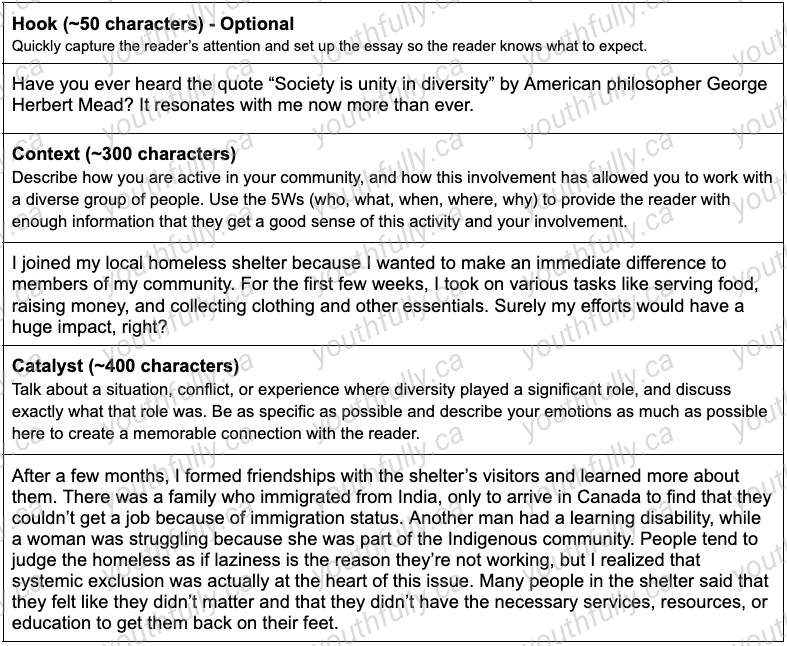
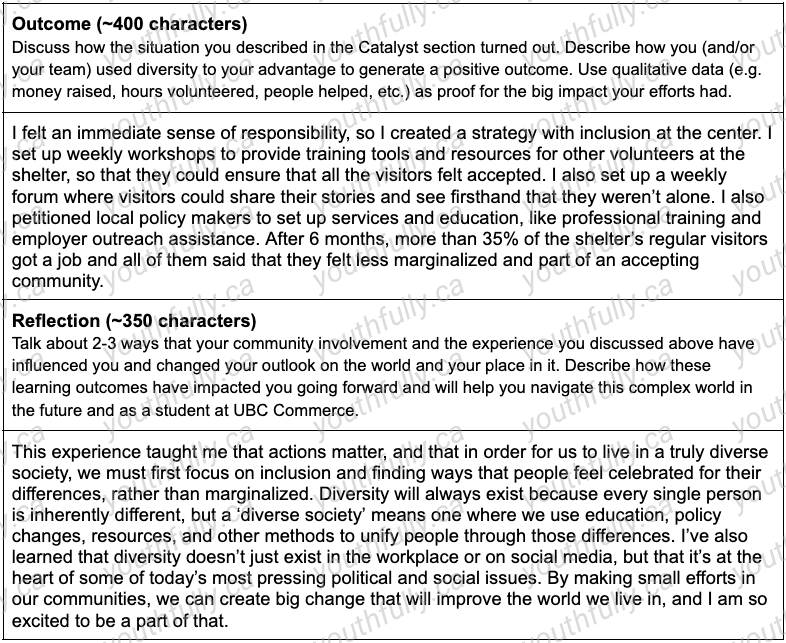
2025 UBC Sauder Application: Personal Profile – Question 3
Tell us about who you are. How would your family, friends, and/or members of your community describe you? If possible, please include something about yourself that you are most proud of and why. (Maximum 500 words)
UBC Sauder Application: Personal Profile Question 3 – Breakdown
This question is an invitation to showcase your personality, character, and values through the eyes of others. It’s an opportunity to give insight into how you are perceived by those close to you and reflect on what makes you unique.
This prompt is about painting a comprehensive picture of who you are beyond academics or extracurriculars. Think about how your family and friends would describe your qualities, personality traits, and strengths. Consider feedback you’ve received from peers, mentors, or community members. This question is also a chance to highlight what you take pride in and why it’s significant to you.
COACH’S TIP: To make your answer stand out, include a mix of descriptions and specific examples that illustrate these traits in action. For instance, if your friends describe you as empathetic, tell a story that demonstrates a time when you showcased empathy. Similarly, if your community knows you as someone who leads by example, share an instance that reflects this.
The “proud of” component is where you can inject depth and personal reflection. Choose an accomplishment or aspect of yourself that has meaning and connects to your values or future aspirations. Explain why this makes you proud and what it reveals about your character or motivations.
A Note on Voice and Authenticity: Write in a way that reflects your natural voice and personality. This isn’t just about listing qualities; it’s about telling a story that helps the reader feel connected to you. Let your genuine self come through, making the response relatable and memorable.
UBC Sauder Application: Personal Profile Question 3 – Template
Get started on your template here (Click File > Make a Copy within the doc).
REMEMBER: There is a 500-word limit for this answer.
We suggest following our Narrative Communication Approach.
UBC Sauder Application: Personal Profile Question 3 – Example
Here’s an example using the Narrative Communication Approach.
REMEMBER: This is an EXAMPLE ONLY and is NOT meant for you to copy. Why? First and foremost, this is plagiarism and is a serious offence. Plagiarizing these essays will result in immediate disqualification from the admissions process. This can be easily detected using technology and application reviewers are usually trained and/or able to spot when an application isn’t original and does not align with an applicant’s background, personality, values, etc.
Hook
The question “why” is a two-edged sword. It’s led to the most incredible breakthroughs and discoveries…but also left many parents thinking twice about their choice to have children.
The things I’m most proud of are my insatiable curiosity and my ability to bring new ideas to life.
Context
This curiosity shaped me from a young age. I’ve always loved exploring ideas, solving problems, and asking questions. As a child, I wasn’t satisfied with simply knowing how something worked—I wanted to understand why it worked that way and how it could be better.
Last year, I noticed something at my school: while our academic achievements and sports victories were regularly celebrated, the creative talents of students often went unnoticed. Students who excelled in art, music, and design didn’t have the same opportunities to showcase their work. That felt wrong to me. Creativity is just as valuable as academic or athletic ability, and I wanted to do something about it.
That’s when my curiosity asked, “Why don’t we celebrate creativity the way we do other achievements?” And then, “What can I do to change that?”
Catalyst
I decided to organize a “Creativity Fair,” an event where students could showcase their artwork, performances, and handmade creations—and even sell their work if they wanted.
Of course, coming up with the idea was the easy part. Making it happen was a different challenge entirely. When I pitched the idea to my principal, she was supportive but cautious. “How will you fund this? How will you get people involved?” she asked. Those questions could have discouraged me, but they only fueled my curiosity further.
I started by forming a team of like-minded classmates. Together, we brainstormed ways to raise money. We hosted bake sales, sold customized school-themed merchandise, and even organized a karaoke night to fund the event. At the same time, I focused on recruiting participants.
I spent hours reaching out to students I knew had creative talents but were hesitant to share them publicly. One of them was a shy ninth grader who loved sculpting but never displayed her work outside of class. I assured her that the fair would be a supportive environment where her talent could shine.
Outcome
The Creativity Fair was more successful than I could have imagined. On the day of the event, the school gym transformed into a vibrant gallery filled with artwork, inventions, and live performances. Over 50 students participated, and hundreds of people attended, including parents, local business owners, and even a city counsellor!
One highlight of the event was seeing one of the ninth graders I had encouraged display her sculptures. She sold several pieces that day and beamed with pride as people complimented her work. She later told me that the fair had given her the confidence to keep creating and even consider starting a small business.
And she wasn’t the only one. I watched as students who had previously felt unseen gained recognition for their talents and had their work celebrated. A group of musicians performed to cheers from over 100 people, while a grade 12 who created intricate jewelry had her pieces sell out completely within 45 minutes. These moments reinforced the importance of my curiosity and my conviction in bringing ideas to life.
Reflection
The Creativity Fair taught me that curiosity isn’t just a personal trait—it’s a tool for creating change. By asking “why” and “how,” I learned how to turn a simple idea into something that positively impacted my community. It also taught me the value of persistence, collaboration, and creative problem-solving in bringing a vision to life.
Although my mom would tell you that the frequency with which I ask ‘why’ can test her patience, I’ve learned to channel this curiosity into productive parts of my life rather than letting is cause friction or conflict.
2025 UBC Sauder Application: Personal Profile – Question 4
What is important to you? And why? (Maximum 500 words)
UBC Sauder Application: Personal Profile Question 4 – Breakdown
This question is your chance to reveal what matters most to you and to provide the admissions team with a deeper understanding of who you are as a person. It’s not just about stating what you value but explaining why it holds such significance in your life.
This question prompts you to share an experience or realization that highlights your core beliefs and what drives you. Think beyond a simple value and choose something that tells a story about your motivations, choices, or the principles that shape your actions. Maybe your commitment to helping others stems from a formative experience in your community, or your drive for excellence was inspired by a challenge that taught you resilience.
Go beyond surface-level answers and aim for a response that provides insight into your character. The best responses will be authentic and reflective, showing what this value means to you and how it influences your life now and in the future.
COACH’S TIP: Create a vivid and specific picture by incorporating storytelling. Let your response showcase not just what you value, but the journey that led to that realization. Share who you were before this value became central to you, what sparked its importance, and how it has guided you since. Make sure your answer is memorable by showing how this value shapes your decisions and reflects your true self.
Choose examples that demonstrate a clear connection to the value and provide a learning outcome that shows growth or insight. The admissions team wants to see that you understand why this value is important and how it has impacted your view of the world. This reflection adds substance and depth, making your response stand out.
Reviewers will look for thoughtful, well-developed responses that communicate your personal growth and why this value matters. By clearly articulating the significance of this value and connecting it to your life experiences, you’ll craft a compelling essay that leaves a lasting impression.
Not sure how to effectively convey your journey and learning? Our Narrative Communication Guide can help refine your storytelling, and connecting with a coach can offer tailored feedback to elevate your response.
UBC Sauder Application: Personal Profile Question 4 – Template
Get started on your template here (Click File > Make a Copy within the doc).
REMEMBER: There is a 500-word limit for this answer.
We suggest following our Narrative Communication Approach.
UBC Sauder Application: Personal Profile Question 4 – Example
REMEMBER: This is an EXAMPLE ONLY and is NOT meant for you to copy. Why? First and foremost, this is plagiarism and is a serious offence. Plagiarizing these essays will result in immediate disqualification from the admissions process. This can be easily detected using technology and application reviewers are usually trained and/or able to spot when an application isn’t original and does not align with an applicant’s background, personality, values, etc.
Hook
Community smells like cinnamon rolls. At least, it did for me on a freezing winter morning when my neighbour Sean, carrying a tray of fresh-baked pastries, knocked on our door after the storm. It wasn’t just food—it was a reminder that even in the toughest times, people show up for one another.
Context
I’ve always believed in the power of community, but two years ago, during a severe winter storm, I saw it in action. The storm left many families in my town without power, heat, or access to supplies. Roads were blocked, isolating neighbourhoods, and the cold crept in fast.
At first, the situation felt overwhelming. Everyone seemed to be struggling alone—until Sean showed up with those cinnamon rolls. That simple gesture made me realise surviving this storm wasn’t about waiting for outside help. It was about coming together.
Catalyst
Inspired by that act of kindness, I decided to do more. My family and I turned our garage into a supply hub, collecting donations like blankets, food, and warm clothing. I spread the word through classmates, neighbours, and local businesses.
What started as a donation centre quickly grew into something bigger. Neighbours began offering more than just items. One volunteered their snowplow to clear driveways; another proposed meal deliveries for families without power. People started working together, offering help in ways I hadn’t anticipated.
I took charge of organising these efforts, creating a group chat to match volunteers with those in need. Every new contribution reminded me that communities grow stronger when people step up for each other.
Outcome
Within a week, our garage became a lifeline for over 100 families. But the real impact wasn’t just in the supplies—it was in the connections we formed.
I’ll never forget when another neighbour, Denise, who’d come to pick up some meals to drop off, paused and said, “I didn’t know we had this kind of community.” Her words stuck with me. We weren’t just sharing resources—we were rebuilding trust and hope in each other.
Even after the storm passed, these bonds remained. Neighbours who barely knew each other started offering help with projects, sharing tools, and building friendships. Hockey and basketball were played in the street more often, and there was more sidewalk chalk on the street than you’d ever seen! The crisis had created a stronger, more connected community.
Reflection
Community is important to me because it’s about more than living near one another—it’s about showing up. The storm taught me that even small gestures, like a tray of cinnamon rolls, can inspire collective action and change.
I now see every community as full of potential. When people come together, even the toughest challenges can be overcome. As a student at UBC, I hope to carry this lesson with me—whether it’s volunteering, leading initiatives, or building a community with peers in specific classes.
For me, community doesn’t just smell like cinnamon rolls—it smells like hope, resilience, and potential.
2025 UBC Sauder Application: Personal Profile – Question 5
Describe up to five activities that you have pursued or accomplishments achieved in one or more of the following areas. Please outline the nature of your responsibilities within these activities:
- Club
- Family/community responsibilities
- Creative or performing arts
- Work/employment
- Athletics
- Volunteer
- Service to others
- Other(s)
UBC Sauder Application: Personal Profile Question 5 – Breakdown
UBC Sauder wants to see a broad range of activities in your Personal Profile, both inside and outside of school.
Choose extracurricular activities, like volunteer work or being a President of your school’s debate club, hobbies, like learning a new language, interests, like competitive swimming at your local community center, and/or even general activities you enjoy doing with your family, friends, or members of your community, like playing tennis.
COACH’S TIP: As mentioned above, the evaluators DON’T want you to simply list a bunch of activities you have done. Instead, they want you to talk about activities and experiences that have created learning outcomes that have profoundly shaped who you are as a person, while communicating these lessons in a unique, authentic, and memorable way (this will be especially important for the next question, which we will discuss more below).
Choose up to 5 activities that will show the depth and breadth of your experiences. We call this the T Model (learn more about it here).
Here, you have 1-2 big activities that you’ve put a lot of time and effort into (this is the depth, or the vertical part of the ‘T’). For example, this could be a non-profit you started in your community, a fundraising event you organized to help address homelessness in your community, or giving a TEDx talk on an issue you are passionate about. These are BIG accomplishments that you’re super proud of. These should be the first ones in your Personal Profile, so you can wow the committee from the beginning. 🙂
Next, you’ll have 2-3 activities that take less time and effort, but are still super important for helping shape who you are (this is the breadth, or the horizontal part of the ‘T’). For example, these could be an online course you took that ignited your interest in finance management or a summer internship you did that helped you develop your communication and leadership skills.
Structuring your activities in this way will show the evaluators that you have well-rounded experience in many areas.
COACH’S TIP: UBC Sauder receives thousands of applications per year, so creating a unique Personal Profile can be tough. We recommend choosing activities that demonstrate your initiative, teamwork, commitment, and achievement. If you are having trouble, connect with a coach and they will help you out.
We know that identifying (and participating in) activities like this can be difficult, especially if you don’t know where to start. But don’t worry, we’ve got your back. Our unique approach will help you and your coach identify and execute audacious and authentic goals (we call these AYA goals) that are perfectly aligned with your interests and passions, so you can accomplish what you want (and have amazing experiences to talk about on your application). Connect with a coach to get started and check out our Goal-Setting Guide now.
UBC Sauder Application: Personal Profile Question 5 – Template
Get started on your template here (click File > Make a copy and save it to your computer).
REMEMBER: There is a maximum of 500 words per activity.
For this question, you will be asked for the following information:
- Activity Type: State what this activity is, using the list above. If your activity isn’t mentioned in that list, write a 1-2 word description.
- Start Date: State when you began this activity (month/day/year)
- End Date (optional): State when you completed this activity (month/day/year). If you are still doing it, leave this blank.
- Ongoing (optional): If this is an ongoing activity, check this box.
- Frequency: Select from the dropdown menu how often you participate in this activity (for example ‘Regular Weekly Activity (5-10 hours per week).
- Short Description (max 300 characters): Briefly describe your role in this activity and what it was for (e.g. President of your school’s economics club). Then, describe what you did, as well as what quantifiable outcomes (i.e. money earned, hours dedicated, etc.) and what you learned as a result of taking part in this activity (if you have space).
COACH’S TIP: When you’re applying, you will have to add each activity individually (see the image below for what it looks like). Our template will ensure that you have all the correct information beforehand so you can have everything prepared and proofread.
UBC Sauder Application: Personal Profile Question 5 – Example
Here’s an example of a list of activities for this question.
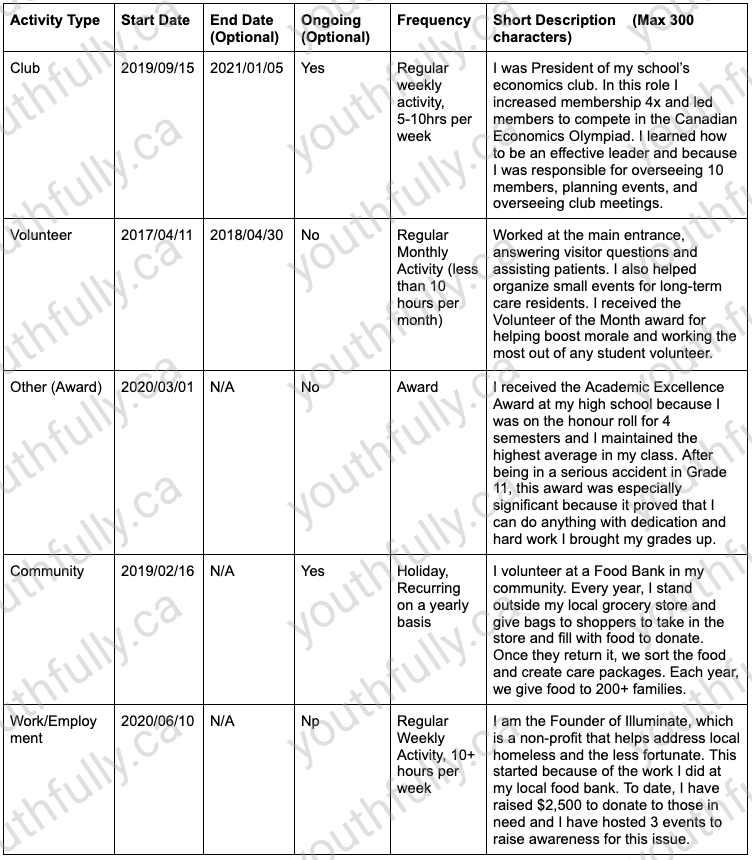
Need help with your Sauder app? We got you.
get a youth coach™Khanh
UBC BCom Grad
Youth Coach™
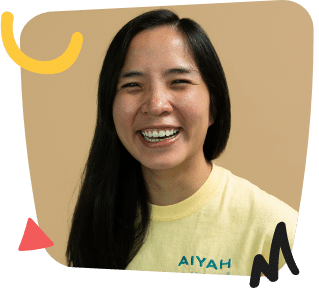
2025 UBC Sauder Application: Personal Profile – Question 6
Tell us more about one or two activities listed above that are most important to you. Please explain the role you played and what you learned in the process. You will be asked for a reference who can speak to your response. (Maximum 500 words)
UBC Sauder Application: Personal Profile Question 6 – Breakdown
This question is an opportunity to showcase an activity (or two) that has had a significant impact on you. The focus is on illustrating how your role contributed to personal growth and what lessons or skills you gained through the experience.
Choose activities where your involvement was meaningful and where you can clearly describe your contributions and growth. The admissions team wants to see more than just a summary; they want to understand the depth of your commitment and how these experiences have shaped you.
COACH’S TIP: Select examples that are unique and highlight your personal journey. Dive into moments that tested you or where you made a notable impact. Your response should paint a clear picture of your dedication and outcomes, using specific, vivid examples to illustrate the learning and skills gained.
Key Points to Emphasize:
- Your Role: Clearly explain your responsibilities and what you did.
- Challenges and Growth: Showcase moments that were challenging and how you navigated them.
- Learning and Impact: Highlight key insights or skills you developed and their significance.
- Authenticity: Ensure your response feels personal and sincere. This is your chance to show the admissions team who you are beyond grades and accolades.
The evaluators are looking for thoughtful, specific answers that demonstrate engagement, leadership, and self-reflection. Make sure to include enough detail to show depth without losing clarity. A strong, reflective response can set you apart and provide a meaningful glimpse into your character.
UBC Sauder Application: Personal Profile Question 6 – Template
Get started on your template here (click File > Make a copy and save it to your computer).
REMEMBER: There is a maximum of 500 words.
We suggest following our Narrative Communication Approach.
UBC Sauder Application: Personal Profile Question 6 – Example
Hook
The hardest decisions don’t come with a flashing sign that says, “Right this way.” Instead, they sneak up on you in moments you least expect—like staring at a whiteboard marker, deciding between speaking up or staying silent. For me, that moment happened in a classroom, and it completely changed how I see leadership.
Context
It was my first week as a peer tutor in my school’s math support program. I’d signed up because I loved math and wanted to help others feel confident tackling difficult problems. But that day, the classroom wasn’t buzzing with collaboration or focus. One student, Jonathan, had taken over the session, loudly criticizing others for not understanding the material as quickly as he did. The other students were quiet, their eyes downcast, clearly uncomfortable.
I hesitated, marker in hand, unsure what to do. Confronting Jonathan felt risky. What if he turned his frustration on me? At the same time, staying silent felt like an even bigger mistake. The group depended on this space to feel safe and supported, and I had a responsibility to make sure that happened.
Catalyst
I decided to act. I walked up to Jonathan and calmly said, “Hey, I understand you’re frustrated, but let’s break this down to figure it out. If they’re not getting it this way, let’s try something else that might work better for them.” His face showed surprise, but he nodded and sat down.
Turning to the group, I shifted the focus by inviting someone else to walk through the solution on the board. I intentionally chose a quieter student, offering gentle encouragement as she explained her thinking. The room began to relax, and others started contributing too. Slowly, the dynamic changed—students who had stayed silent earlier began asking questions and engaging with the problems.
Outcome
By the end of the session, the group felt like a different place. Jonathan even apologized quietly as he packed up his things, and I saw him helping another student during the next session.
That day taught me that leadership isn’t always about having authority—it’s about stepping up when the moment calls for it. It’s about creating an environment where everyone feels valued and supported. My decision to address Jonathan wasn’t easy, but it allowed the group to refocus and ensured no one felt left behind.
Reflection
This experience reshaped my understanding of leadership. I realized it’s not just about managing situations—it’s about fostering collaboration and ensuring everyone’s voice is heard. It also showed me the importance of courage, even when the stakes seem small. That single moment of speaking up had a ripple effect on the group, and it strengthened my confidence in my ability to lead.
I’ve carried this lesson into other areas of my life, whether it’s working on group projects, volunteering, or coaching sports teams. Leadership is about choosing the harder path when it’s the right thing to do and ensuring the people around you feel empowered.
2025 UBC Sauder Application: Personal Profile – Question 7
Additional Information (Optional): You may wish to use the space below to provide UBC with more information on your academic history to date and/or your future academic plans. For example: How did you choose your courses in secondary school? Are there life circumstances that have affected your academic decisions to date? What have you done to prepare yourself specifically for your intended area of study at UBC? (maximum 500 words)
UBC Sauder Application: Personal Profile Question 7 – Breakdown
So far in your Personal Profile, you’ve given the admissions committee some insight into your experiences and achievements inside and outside of the classroom with volunteer opportunities, extracurriculars, and various other activities.
All of these questions show how you undertake responsibilities, deal with setbacks when they arise, and have grown as a person along the way. Think of this as the development of your interests and passions through the activities you are involved in.
Question 7, on the other hand, focuses less on extracurriculars and other activities, and looks inside the classroom. Here, the reviewers want to know how your academic journey has developed your interest in business and led to you applying to UBC Sauder.
This question is very open-ended so that you can focus on any area that has impacted your academic choices and performance. This is a great place for you to provide more context about any irregularities in your transcripts, like a course you didn’t do the best in or explaining a gap year you took.
If you aren’t sure what to write here (if anything at all), have a look at your Student Identity Blueprint™ to help you identify why your interest in business began, your achievements thus far, and the skills/values that helped shape this interest (and who you are more generally). If you haven’t already completed your Blueprint, connect with a coach to get started on one.
The most important thing to focus on for this question is how your courses in high school helped you develop your interest in business, which you are then continuing to explore at UBC Sauder.
You can discuss a gradual development over time or a specific event that changed academic choices/plans.
Focus on business courses as much as you can here, like Business Studies, Accounting, or Entrepreneurship. Think about such questions as:
- What made you want to take this course?
- What challenges did you face when you did?
- How did this evolve your interest in business more generally?
- What skills, like leadership, communication, team work, and problem solving, did you develop along the way, and how?
- How will these skills and experiences you developed help you at Sauder, and how?
COACH’S TIP: Use specific details and talk about the emotions you experienced as much as you can. This will help create an emotional connection with the reader and transport them into exactly what you felt during the situation/experience you are talking about.
If you are unsure how to approach this question, connect with a coach to find an authentic angle that will connect with the reviewers while communicating your unique journey.
UBC Sauder Application: Personal Profile Question 7 – Template
Get started on your template here (click File > Make a copy and save it to your computer).
REMEMBER: There is a maximum of 500 words.
We suggest following our Narrative Communication Approach.
UBC Sauder Application: Personal Profile Question 7 – Example
Here’s an example of an answer to this question:
REMEMBER: Please note that all of the examples in this guide are EXAMPLES ONLY and are NOT meant for you to copy.
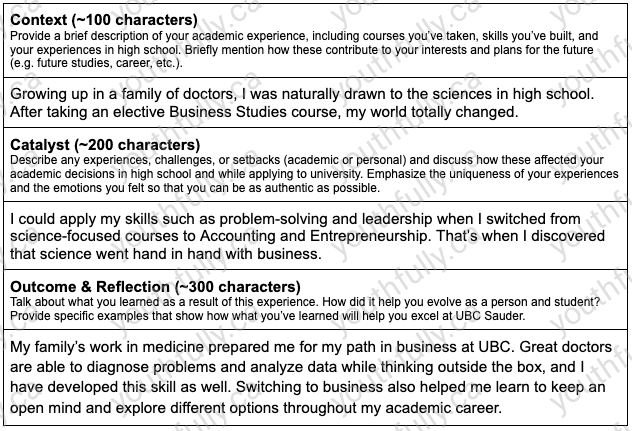
2025 UBC Sauder Application: Personal Profile – Question 8
Please submit the names of two referees who know you well and can comment on your preparedness for study at UBC. Examples of referees include an employer, a community member, a coach, a teacher/instructor, or anyone who knows you well. One of the referees you select MUST be able to speak to one of the activities / experiences described in one of your long-answer responses above. For applicants who are currently attending a high school, one of your referees MUST be a school official (e.g. grade 12 or senior year counsellor, teacher, or IB Coordinator). Neither referee should be a friend, family member, or paid agent.
UBC Sauder Personal Profile Question 8 – Breakdown
The purpose of this question is so that UBC Sauder can verify the activities, experiences, and learning outcomes you discussed in the previous questions.
Before listing the names and contact information for your references, make sure that you ask them for permission first, so that if they get a call or email from UBC Sauder then they’re not surprised.
UBC Sauder Personal Profile Question 8 – Template
Get started on your template here (click File > Make a copy)
You will need the following information:
- First Name
- Last Name
- Relationship
- Email Address
- Phone Number
UBC Sauder Personal Profile Question 8 – Example
Here an example of the information for this section:
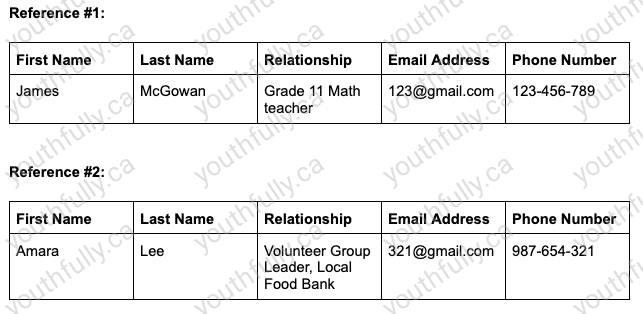
You Might Also Like
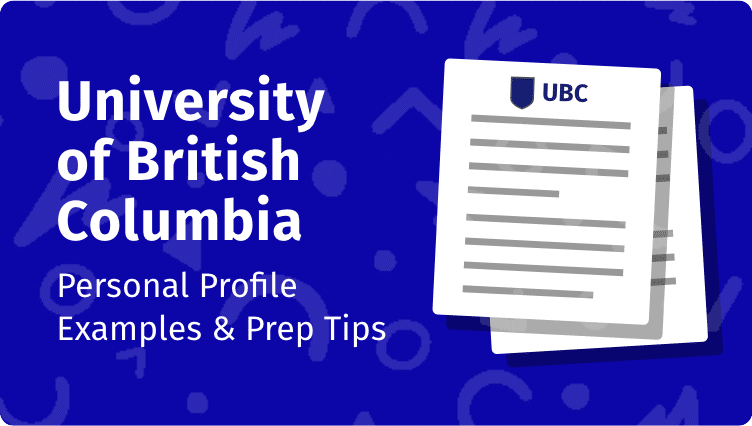
Application Prep
UBC Personal Profile: Examples, Question Samples & Prep Tips 2024/2025
If you’re looking for UBC Personal Profile questions, examples, and prep tips, then you’ve come to the right place. In… Read more
2025 UBC Sauder Video Interview Questions
The video interview is the second major component of your UBC Commerce application.
Here’s a quick snapshot of what to expect:
- You will have a set amount of time to complete your answers.
- You will get 1 mock question to practice, with two attempts to answer it.
- You will be given 2 formal video questions, and you will not know the question until the time you record your answer.
- For each formal video question, you will get 30 seconds to think about your answer, followed by 1.5 minutes to answer the question.
As mentioned above, the video interview is worth 20% of your overall admission evaluation. That’s a lot, so you want to make sure you’re hitting this component out of the park. 🙂
UBC Commerce is looking for students who are articulate, passionate, and dedicated. They learned a bit about you in your Personal Profile, but now they can get even more insight into who you are, what you’ve experienced, what your interests are, and why you want to be a UBC Sauder student.
The admissions committee also wants to see that you can work well under pressure, have the drive to succeed in the program, and can think critically and solve problems.
We know video interviews are super scary, but trust us — feeling prepared will give you a TON of confidence so you can do a great job on the interview.
That’s why we created this guide to give you possible questions, tips to prepare, and more, so you can let your personality and confident self shine!
We know that interviews are super scary! We’ve analyzed thousands of questions and come up with a unique way to prepare for the most common types of interview questions, so you can ace any questions that comes your way. To learn more, check out our Interview Prep Skills Guide here. It’s full of useful templates and prep tips to help you feel more confident going into the interview. If you want to take your interview prep to the next level, connect with a coach for 1-on-1 support. 🙂
UBC Sauder Interview Questions – Possible Questions
Here are some examples of the types of questions you can expect for your video interview:
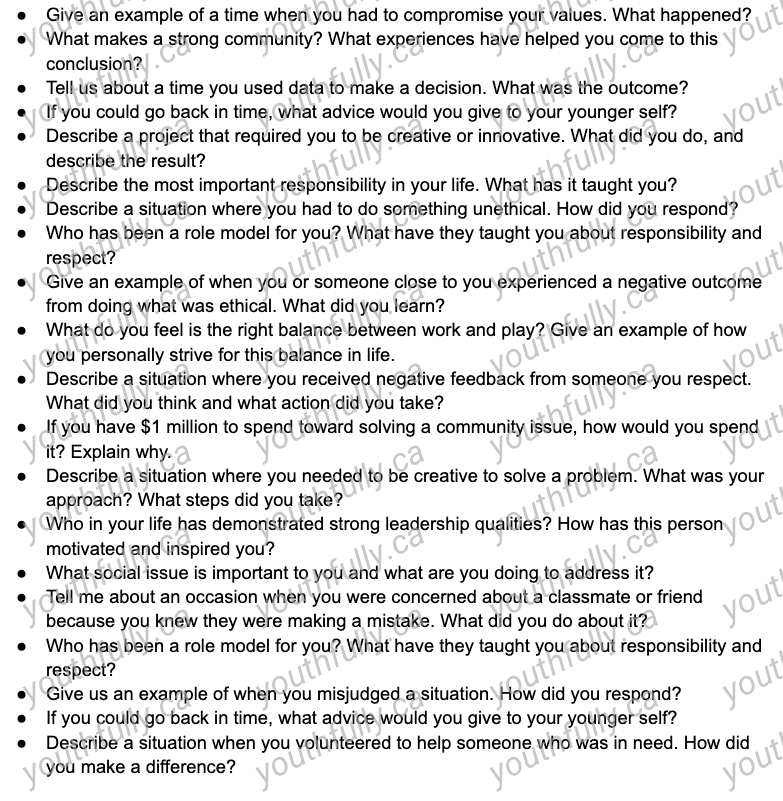
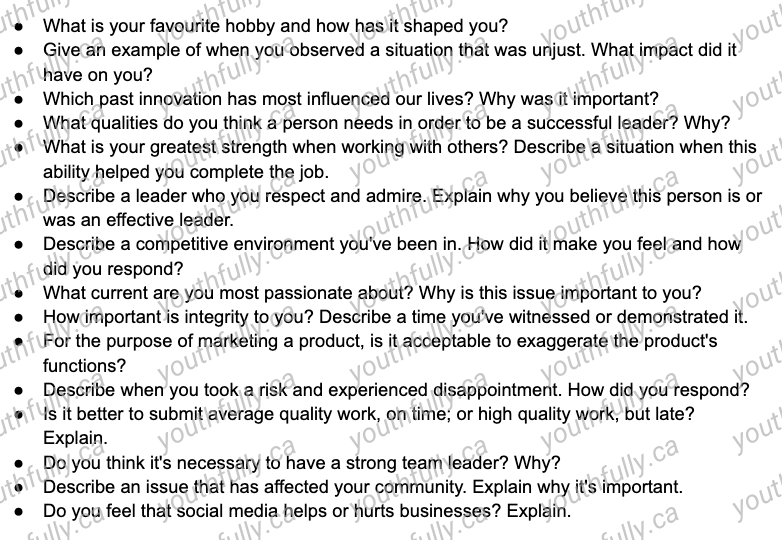
You’ll notice that most of these questions are personal questions, meaning they’re all about you — like who you are, what you value, what you would do in a certain situation, your interests, and the experiences you have had working on your own and with others.
These questions are meant to gauge how you react to situations and how you apply key skills like leadership, problem solving, organization, and time management, in all areas of your life.
COACH’S TIP: Don’t waste your valuable time coming up with different answers to every single practice question. We’ve identified 10 common themes that personal questions fall into and broken each theme down, and provided templates and examples of each type so you’ll be prepared to answer any question that comes your way. Check out the themes and much more in our Interview Skills Guide.
The admissions committee also wants to see that you have self-awareness. This means that they want to make sure you know what your skills are (and what you need to improve on), what you value, and how you plan to make a difference in the world.
It may seem obvious and you’re probably thinking, “Duh.. of course I know what I’m good at and what I care about.”
This might surprise you, but very few students actually focus on self-awareness. You might think you have it all figured out, but it’s probably more surface-level than you think.
That’s why we have a whole phase in our coaching methodology (the Discovery phase) where we use a Student Identity Blueprint™ to help you figure out who you are and what makes you tick. Then, when questions like these are asked during the interview, you’ll know EXACTLY how to respond.
If you haven’t already, connect with a coach to get started on your Student Identity Blueprint™.
UBC Commerce Interview Questions – Examples
When preparing for this section of the UBC Sauder BCom application, practice is key.
Open up your camera and choose a few questions from the section above. Record yourself and practice answering the questions as best you can. Trust us, after a little while you’ll get better and then you’ll have the confidence to do a great interview. You can also work 1-on-1 with your coach and do mock interviews (if you haven’t already, connect with a coach)!
To help get you started, one of our Youth Coaches has recorded two video question examples.
Here’s an example for the video question: “Is it better to submit average quality work, on time; or high quality work, but late? Explain.”
Here’s another example for the question: “Who has been a role model for you? What have they taught you about responsibility and respect?”.
How to Prepare for the UBC Sauder Commerce Interview – Question Tips
Many students ask us for tips for preparing for the UBC Sauder video interview component of their application.
Here are the ones we think will help you the most for your video interview:
TIP #1: ALWAYS ANSWER THE ENTIRE QUESTION
It seems silly, but it is common to get off track and later realize you didn’t answer the question. Break down each part of the question into smaller components, and address each one as you move through your answer.
TIP #2: TAKE YOUR TIME
Sometimes when you know you have a limited amount of time you might speed through everything like a mad race against the clock. As you answer the question, remember to take a breath and pause between your sentences to allow the reviewer time to process what you said. Focus on speaking clearly and slowly.
TIP # 3: TELL IMPORTANT INFO ABOUT YOU
Remember that every answer you give should tell the interviewer something about you that boosts your application, even if the question isn’t about you.
Highlight your skills and experiences, show that you have thought about goals, and use the questions to help the admissions committee learn more about you (and want to have you as a part of the program).
TIP #4: BE CONCISE:
Your answers should be clear and to the point, leaving out unnecessary information. During the interview, don’t ramble — get to the point and be clear. It is better to have a short, concise answer than a convoluted answer that is redundant and possibly unfocused.
TIP #5: BE PROFESSIONAL (BUT ALSO HAVE FUN!)
When preparing for your video questions make sure that you come across as a young professional with something special to offer the program. How can you do this?
- Dress professionally
- Make sure the background behind your camera is empty
- Go somewhere that is quiet and free from distractions
- Maintain eye contact with the camera as you give your answers
- Be aware of your posture and where your hands are (you don’t want to appear like you’re slouching or fidgeting on the screen)
While it’s important to be professional, it’s also important to have fun with these questions. The admissions committee wants to admit unique people who have a shining personality and the experiences to match. Show them who you are and be yourself.
TIP #6: DIFFERENTIATE YOURSELF
The admissions committee reviews thousands of applications. You’ll never stand out if your answers are the same as everyone else’s, so come up with answers that are unique.
For example, if there’s a question that asks “Describe a time when you had to adapt” don’t simply talk about how COVID made everything more difficult. Instead, you can talk about a leadership experience where you took on a challenge and tried something that hadn’t been done before. Then, shift the question into talking about your successes and what you learned from the experience.
Trying to come up with a different approach is important and you should only resort to these easy answers if you get stuck. Using storytelling to create an emotional connection with the reviewers can also make a huge difference in creating a unique, authentic, and memorable application. Check out this blog about our Narrative Communication Approach™ to learn more.
If you would like more tips to help you prepare, as well as the chance to up your game and do some mock interviews, connect with a coach today. Our coaches have helped hundreds of students do great interviews and achieve admissions success!
You Might Also Like
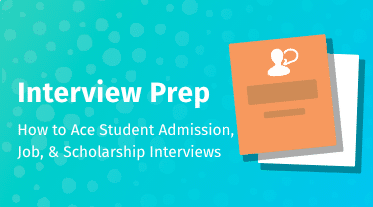
Skills Training
Interview Prep: How to Ace Student Admission, Job, and Scholarship Interviews
Even though you’ll do dozens of interviews during the course of your academic and professional career, you’ve probably had no… Read more
UBC Sauder Interview – Questions Themes
Even though you might not know exactly what questions you’re going to be asked, it will help to think generally about a few themes and ideas that you can use across various types of questions.
Here are some themes you can draw upon as you’re thinking about your answers.
LEADERSHIP
It is very likely that there may be a question around leadership. To prepare for this, make sure you know a few examples of how you have shown leadership in the past. It is important to not just explain what the leadership role you had, but actually how you demonstrated that leadership (being the President of a club doesn’t necessarily mean you are a good leader).
COMMUNITY
UBC Sauder wants students who are actively involved in the community (you’ll also notice a question about it on your Personal Profile). Community involvement shows commitment, selflessness, and passion, but also because it highlights time management. Make sure you have 1 or 2 examples of how you have been involved in your community. As much as possible, quantify the impact you had.
CONFLICT
There is often a question about how you have dealt with conflict. This is mainly around how you have dealt with conflict in a team setting or a potential inflammatory situation. Remember to not just focus on the problem, but more so the resolution or lessons learned.
TEAM WORK
In addition to conflict in team settings, a lot of the time there are questions about how you have worked in a team effectively. Once again, make sure you can clearly define how you succeed in the team, and not just the team’s success.
TIME MANAGEMENT
There are questions that are really just structured around seeing how you handle pressure and manage your time. Be sure to really explain why the example you are giving is a good example of how you can manage your time and operate under stressful situations.
ACHIEVEMENT
This is an opportunity for you to discuss something you have achieved. For this, try to think of something that is differentiated and you can really explain how you achieved it, and why that achievement will help you at UBC Sauder.
BUSINESS
In short, you need to know why you want to study business, and how it will lead to a future career. Be specific and think ambitiously.
UBC SAUDER SCHOOL OF BUSINESS
Similarly, you need to be able to concisely communicate why you want to attend UBC Sauder. Make sure to do lots of research and use it in your answer. The more depth to your research, the more differentiated your answer will be. In all of your answers, make sure you have a statement (or a ‘pitch’) at the end of each answer that shows exactly why you are the perfect fit for the program and how you would add value to their program as a student.
If you want to learn how you can align these themes to your unique interests and experiences, check out our Interview Skills Guide and connect with a coach now.
Find the mentor you’ve been looking for.
get a youth coach™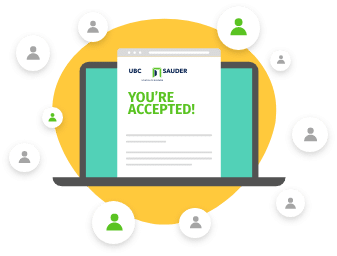
2021/2022 UBC Sauder Application
UBC Sauder 2022 Fall Application – Overview
The UBC Sauder Application is made up of two parts (see below for how each is evaluated):
- Personal Profile: A series of experience/interest questions as well as a ‘resume’ style list of activities/accomplishments and the contact info for two references.
- Timed Video Responses: 2 randomly generated video interview questions.
REMEMBER: The Online Application for UBC Sauder BCom (including the Personal Profile, Interview, and all required documents) must be submitted by January 15, 2025 at 11:59pm PST.
The entire application must be submitted through a platform called EducationPlannerBC, where you will write your Personal Profile. The video responses are completed through a third-party site called Vidcruiter. Once you have recorded your responses, you will copy and paste the confirmation URL from Vidcruiter into your EducationPlannerBC application.
The 2021/2022 UBC Commerce Personal Profile has short written essays with 6 questions that are focused on your experiences, leadership opportunities, interests, and more. This part of the application counts for 30% of the overall evaluation.
As mentioned above, your Personal Profile counts for 30% of your overall evaluation.
REMEMBER: Check out this template we created to help you write unique and memorable essays (keep reading for breakdowns and examples for each question).
2021/2022 UBC Sauder Application: Personal Profile – Question 1
“Explain how you responded to a problem and/or an unfamiliar situation. What did you do, what was the outcome, and what did you learn from the experience?” (Maximum 1,500 characters)
UBC Sauder Application: Personal Profile Question 1 – Breakdown
As the first question in your Personal Profile, this is where you have the opportunity to make a strong first impression.
This question prompts you to discuss a meaningful experience, where you were required to address a challenge or uncomfortable situation. The important thing here isn’t so much what the situation was, but how you handled adversity and what you learned from it.
Maybe you learned a new strategy for being a leader, or you saw the benefits of getting outside of your comfort zone, or you learned something about yourself.
Go beyond the surface and try to think of a problem/unfamiliar situation that will allow you to provide deep insight and self-awareness. Be as unique as possible, drawing out a learning outcome that is unexpected and memorable.
COACH’S TIP: Paint a vivid and detailed picture as much as possible, showing who you were before this problem and/or unfamiliar situation happened, and then what your initial reaction was, and how you resolved it. Let your personality shine through, while taking the reader on the journey with you.
Choose only experiences where you have a clear learning outcome that has changed who you are and how you view the world. You want to make sure that your answer has substance.
The reviewers want to see that you’ve really thought about why this learning outcome is important and how it can be applied to your life today (and in the future). If you can do this, we guarantee that your essay will stand out from other applicants.
Not sure how to communicate your personal growth and learning in essay questions like these? Our Narrative Communication Guide is a great place to start, and you can also connect with a coach to take your essay response to the next level.
UBC Sauder Application: Personal Profile Question 1 – Template
Get started on your template here (click File > Make a copy and save it to your computer).
REMEMBER: There is a 1,500 character limit for this answer.
Here’s a template that follows our Narrative Communication Approach:
- Hook (~100 characters) – Optional
- Quickly capture the reader’s attention and set up the essay so they know what to expect.
- Context (~200 characters)
- Set the scene with who you were before this problem/unfamiliar situation happened using the 5Ws (Why, What, When, Where, Why). If you can, focus on explaining who you were before this problem/situation occurred, like what you believed in, valued, etc.
- Catalyst (~200 characters)
- Describe the problem/unfamiliar situation and exactly what happened. Paint the picture vividly with your words and try to give enough detail so the reader feels like they are there with you. Briefly describe your emotions when this problem/situation occurred.
- Outcome (~350 characters)
- Discuss how you responded to this problem and/or unfamiliar situation, and what happened because the situation occurred (this is the ‘after’ scenario that you introduced in the Context section).
- Reflection (~650 characters)
- Provide deep insight into some specific learning outcomes that occurred during this experience. Focus on 1-2 themes, while providing specific examples of the impact this experience had on your life today. Finally, write 1-2 sentences about how this experience will help you as a student in the UBC Sauder BCom program.
UBC Sauder Application: Personal Profile Question 1 – Example
Here’s an example of how to answer this question.
REMEMBER: These examples are examples ONLY and are not meant for you to copy.

2021/2022 UBC Sauder Application: Personal Profile – Question 2
“Give us an example of how the pandemic has changed your involvement in the community or group most important to you. What have you learned from this experience? (Maximum 1500 characters)”
UBC Sauder Application: Personal Profile Question 2 – Breakdown
This question is similar to Question 1 because it again asks you to discuss your ability to adapt and learn during difficult situations. Think of the pandemic here as similar to the problem/unfamiliar situation you talked about in Question 1.
Then, take it one step further and give insight into who you are by describing the causes, activities, and community initiatives you care most about.
Even though we know that COVID was super stressful for everyone, don’t be overly negative in your answer. Instead, draw out 1-2 positive opportunities and experiences it has provided to you as a leader, like pivoting your perspective or driving personal growth and change, teaching you something you didn’t know about yourself, evolving your skills, etc.
Similar to Question 1, you should provide deep personal insight and learning outcomes, while using your chosen experience to highlight your passion, dedication, and commitment. Be as unique as possible. Go beyond simply saying “The pandemic was hard because everything closed.” Instead, paint the picture of your involvement in your community/group before COVID (‘before’) and then talk about how you faced this challenge and came out better in the end (‘after’). Take the reader on a journey with you, while describing your emotions and showcasing your personality.
For example, if you volunteer as Vice President Events and Fundraising at your local Salvation Army, you could use this experience as an example to talk about your how your interest in helping the underprivileged population of your community started because your parents immigrated to Canada when you were young and you saw how hard it was for them to make ends meet. This valuable context will help you establish a strong emotional connection with the reader (and it will make your answer more memorable). Then, you could move into the COVID-19 portion of the question, where you discuss how your involvement shifted and what you learned from that.
The most important thing here is to write an authentic and memorable story that articulates who you are as well as your growth, learning, and change over time. To make this process easier for you, we’ve developed the Narrative Communication Approach™ so you can create memorable essays using storytelling. Read more about it here or connect with a coach to learn how to use it in your Personal Profile responses.
UBC Sauder Application: Personal Profile Question 2 – Template
Get started on your template here (click File > Make a copy and save it to your computer).
Your essay should have these five components:
- Hook (~100 characters) – Optional
- Quickly capture the reader’s attention and set up the essay so they know what to expect.
- Context (~250 characters)
- Discuss how you were involved in the community and/or a group that was particularly important to you before the pandemic. Paint a ‘before’ picture here, so that the real impact can be felt later on in the paragraph.
- Catalyst (~300 characters)
- Describe in detail how COVID-19 changed everything about this community activity/group for you. Answer the questions: When COVID hit, what happened? Did it impact your involvement in the community/the group that was most important to you? What was the most difficult part and how did you respond? Describe your emotions as much as possible here.
- Outcome (~350 characters)
- Discuss how you responded to these challenges. Give 1-2 examples of the shift/changes you had to make and any effects this had on your community involvement/group. Finally, state what happened after all your efforts, listing quantifiable outcomes (i.e. money raised, hours worked, members added, etc.) as much as possible.
- Reflection (~500 characters)
- Describe how this experience allowed you to learn and grow as a leader and student. Provide deep insight and a unique learning outcome. Focus on 1-2 themes, while providing specific examples of the impact this experience had on your life today. Finally, briefly state how you will use this learning at UBC Sauder.
UBC Sauder Application: Personal Profile Question 2 – Example
Here’s an example of how to answer this question:
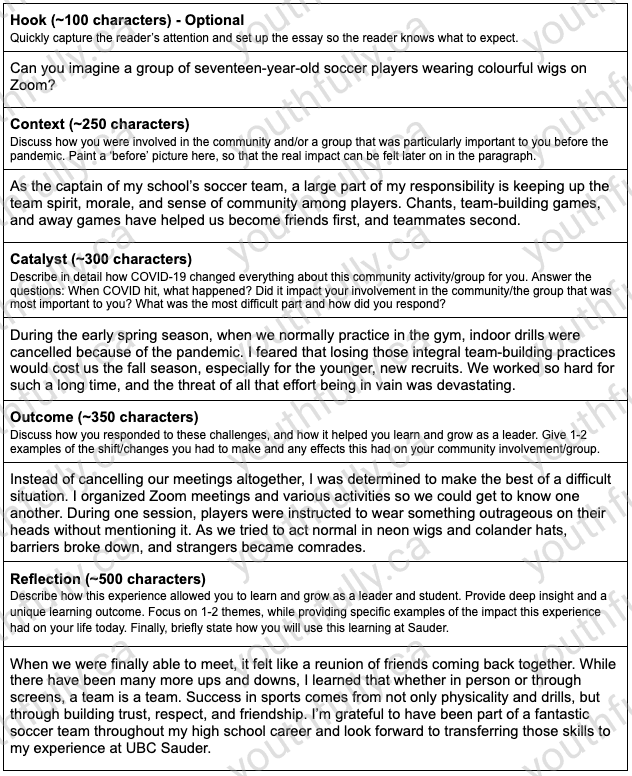
You Might Also Like
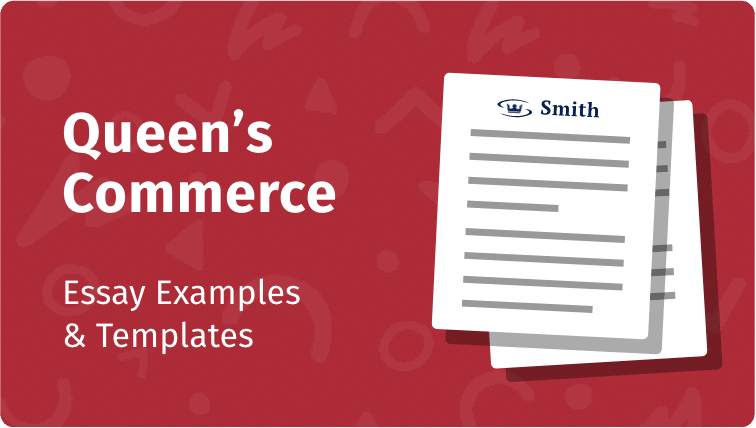
Application Prep
Queen’s Commerce: Supplementary Application Essay Examples & Templates 2024/2025
If you are looking for guidance on the Queen’s (Smith) Commerce supplementary application, as well as Queen’s Commerce essay examples… Read more
2021/2022 UBC Sauder Application: Personal Profile – Question 3
“List up to five activities or accomplishments in one or more of the following areas:
- Athletics
- Clubs
- Creative and performing arts
- Family and community
- Service to others
- Volunteering
- Work or employment
- Other
UBC Sauder Application: Personal Profile Question 3 – Breakdown
UBC Sauder wants to see a broad range of activities in your Personal Profile, both inside and outside of school.
Choose extracurricular activities, like volunteer work or being a President of your school’s debate club, hobbies, like learning a new language, interests, like competitive swimming at your local community center, and/or even general activities you enjoy doing with your family, friends, or members of your community, like playing tennis.
The point is here to choose activities and experiences that have created learning outcomes that have profoundly shaped who you are as a person. This will be especially important for Question 4 (which we’ll discuss more below).
Choose up to 5 activities that will show the depth and breadth of your experiences. We call this the T Model (learn more about it here).
Here, you have 1-2 big activities that you’ve put a lot of time and effort into (this is the depth, or the vertical part of the ‘T’). For example, this could be a non-profit you started in your community, a fundraising event you organized to help address homelessness in your community, or giving a TEDx talk on an issue you are passionate about. These are BIG accomplishments that you’re super proud of. These should be the first ones in your Personal Profile, so you can wow the committee from the beginning. 🙂
Next, you’ll have 2-3 activities that take less time and effort, but are still super important for helping shape who you are (this is the breadth, or the horizontal part of the ‘T’). For example, these could be an online course you took that ignited your interest in finance management or a summer internship you did that helped you develop your communication and leadership skills.
Structuring your activities in this way will show the evaluators that you have well-rounded experience in many areas.
COACH’S TIP: UBC Sauder receives thousands of applications per year, so creating a unique Personal Profile can be tough. We recommend choosing activities that demonstrate your initiative, teamwork, commitment, and achievement. If you are having trouble, connect with a coach and they will help you out.
We know that identifying (and participating in) activities like this can be difficult, especially if you don’t know where to start. But don’t worry, we’ve got your back. Our unique approach will help you and your coach identify and execute audacious and authentic goals (we call these AYA goals) that are perfectly aligned with your interests and passions, so you can accomplish what you want (and have amazing experiences to talk about on your application). Connect with a coach to get started and check out our Goal-Setting Guide now.
UBC Sauder Application: Personal Profile Question 3 – Template
Get started on your template here (click File > Make a copy and save it to your computer).
REMEMBER: There is a maximum of 300 characters per activity.
For this question, you will be asked for the following information:
- Activity Type: State what this activity is, using the list above. If your activity isn’t mentioned in that list, write a 1-2 word description.
- Start Date: State when you began this activity (month/day/year)
- End Date (optional): State when you completed this activity (month/day/year). If you are still doing it, leave this blank.
- Ongoing (optional): If this is an ongoing activity, check this box.
- Frequency: Select from the dropdown menu how often you participate in this activity (for example ‘Regular Weekly Activity (5-10 hours per week).
- Short Description (max 300 characters): Briefly describe your role in this activity and what it was for (e.g. President of your school’s economics club). Then, describe what you did, as well as what quantifiable outcomes (i.e. money earned, hours dedicated, etc.) and what you learned as a result of taking part in this activity (if you have space).
COACH’S TIP: On the EducationPlannerBC site, you will have to add each activity individually to your profile. Our template will ensure that you have all the correct information beforehand so you can have everything prepared and proofread.
UBC Sauder Application: Personal Profile Question 3 – Example
Here’s an example of a list of activities for this question:

2021/2022 UBC Sauder Application: Personal Profile – Question 4
“Tell us more about ONE or TWO activities listed above that are most important to you. Please explain the role you played and what you learned in the process. You will be asked for a reference who can speak to your response. (Maximum 2100 characters)“
UBC Sauder Application: Personal Profile Question 4 – Breakdown
This question gives you the chance to discuss further insight into the impact your experiences have had on you and how they’ve shaped who you are.
We recommend choosing 1 activity to write your essay on so that you can provide enough detail and create a memorable and unique story.
However, if you have two activities that both helped you discover a similar learning outcome, then you can write about 2.
For example, if you volunteered to help organize a fundraising event for Alzeheimer’s research and awareness, you could talk about why you took on this role, and then the leadership skills, time management, team work, and problem solving skills you developed along the way. Talking about this one activity using the template below is perfectly fine. However, let’s say you with the help of your Youth Coach you took your goals to the next level and started your own non-profit to continue the journey to fund research for this disease. This would be a great opportunity to discuss two activities because it shows your dedication and your evolving leadership and interest in entrepreneurship and business.
It’s also important to choose an activity that you genuinely care about, so that you can convey your passion to the admissions committee. Your experiences make up what you value and what you care about. If you completed your Student Identity Blueprint™, it will be really easy to choose activities that align to your Nurtured Values and communicate these values in your Personal Profile. If you haven’t filled out your Blueprint, connect with a coach to get started.
COACH’S TIP: Make sure you give your reference a heads up that UBC Sauder might contact them. Discuss the activity you were involved in, as well as your role, responsibilities, and what you learned as a result of that experience. You can even email some talking points for them to use when Sauder gets in touch with them. You don’t want your essay to give one learning outcome and then your reference to give another, so take the time to make sure the messaging is aligned.
Finally, when discussing what you learned in the process, make sure you really focus on the qualities that Sauder looks for in its students, like leadership, community involvement, team work, and a passion for business.
If you need help deciding which activity from Question 3 to choose, connect with a coach for support. They can help you write an authentic and memorable response that will help you stand out from other applicants and increase your chances of admission success.
UBC Sauder Application: Personal Profile Question 4 – Template
Get started on your template here (click File > Make a copy and save it to your computer).
Your essay should have these five components:
- Hook (~200 characters) – Optional
- Quickly capture the reader’s attention and set up the essay so the reader knows what to expect.
- Context (~400 characters)
- State the activity that you are discussing from the list you gave in Question 3. Describe what you did in that activity (i.e. your role, responsibilities, etc.). Try to answer the 5Ws (who, what, when, where, and why).
- Catalyst (~500 characters)
- Describe who you were before you started this activity and how your interests, values, etc. evolved while you were doing it. This can be a specific event that occurred while you took part in this activity or change over time.
- Outcome & Reflection (~1,000 characters)
- Describe how this experience allowed you to learn and grow as a leader and student (this is the ‘after’ picture that you started in the Catalyst section). Provide deep insight and a unique learning outcome. Focus on 1-2 themes, while providing specific examples of the impact this activity had on your life today. Finally, briefly state how you will use this learning at Sauder.
UBC Sauder Application: Personal Profile Question 4 – Example
Here’s an example from the list of activities in Question 3, from a student who was the President of their school’s economics club.
REMEMBER: This is an EXAMPLE ONLY and is NOT meant for you to copy.
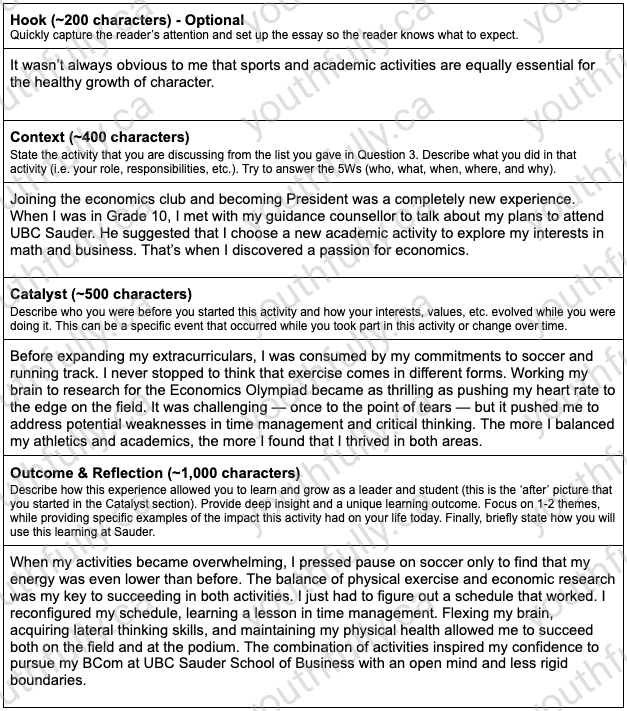
You Might Also Like

Application Prep
Queen’s Commerce: Supplementary Application Essay Examples & Templates 2024/2025
If you are looking for guidance on the Queen’s (Smith) Commerce supplementary application, as well as Queen’s Commerce essay examples… Read more
2021/2022 UBC Sauder Application: Personal Profile – Question 5
“Additional Information (Optional): You may wish to use the space below to provide UBC with more information on your academic history to date and/or your future academic plans. For example: How did you choose your courses in secondary school? Are there life circumstances that have affected your academic decisions to date? What have you done to prepare yourself specifically for your intended area of study at UBC? (maximum 600 characters)“
UBC Sauder Application: Personal Profile Question 5 – Breakdown
So far in your Personal Profile, you’ve given the admissions committee some insight into your experiences and achievements inside and outside of the classroom with volunteer opportunities, extracurriculars, and various other activities.
All of these questions show how you undertake responsibilities, deal with setbacks when they arise, and have grown as a person along the way. Think of this as the development of your interests and passions through the activities you are involved in.
Question 5, on the other hand, focuses less on extracurriculars and other activities, and looks inside the classroom. Here, the reviewers want to know how your academic journey has developed your interest in business and led to you applying to UBC Sauder.
This question is very open-ended so that you can focus on any area that has impacted your academic choices and performance. This is a great place for you to provide more context about any irregularities in your transcripts, like a course you didn’t do the best in or explaining a gap year you took.
If you aren’t sure what to write here (if anything at all), have a look at your Student Identity Blueprint™ to help you identify why your interest in business began, your achievements thus far, and the skills/values that helped shape this interest (and who you are more generally). If you haven’t already completed your Blueprint, connect with a coach to get started on one.
The most important thing to focus on for this question is how your courses in high school helped you develop your interest in business, which you are then continuing to explore at UBC Sauder.
You can discuss a gradual development over time or a specific event that changed academic choices/plans.
Focus on business courses as much as you can here, like Business Studies, Accounting, or Entrepreneurship. Think about such questions as:
- What made you want to take this course?
- What challenges did you face when you did?
- How did this evolve your interest in business more generally?
- What skills, like leadership, communication, team work, and problem solving, did you develop along the way, and how?
- How will these skills and experiences you developed help you at Sauder, and how?
COACH’S TIP: Use specific details and talk about the emotions you experienced as much as you can. This will help create an emotional connection with the reader and transport them into exactly what you felt during the situation/experience you are talking about.
If you are unsure how to approach this question, connect with a coach to find an authentic angle that will connect with the reviewers while communicating your unique journey.
UBC Sauder Application: Personal Profile Question 5 – Template
Get started on your template here (click File > Make a copy and save it to your computer).
If you choose to answer this question, your response should have these 3 components that are in line with our Narrative Communication Approach™:
- Context (~100 characters)
- Provide a brief description of your academic experience, including courses you’ve taken, skills you’ve built, and your experiences in high school. Briefly mention how these contribute to your interests and plans for the future (e.g. future studies, career, etc.).
- Catalyst (~200 characters)
- Describe any experiences, challenges, or setbacks (academic or personal) and discuss how these affected your academic decisions in high school and while applying to university. Emphasize the uniqueness of your experiences and the emotions you felt so that you can be as authentic as possible.
- Outcome & Reflection (~300 characters)
- Talk about what you learned as a result of this experience. How did it help you evolve as a person and student? Provide specific examples that show how what you’ve learned will help you excel at UBC Sauder.
UBC Sauder Application: Personal Profile Question 5 – Example
Here’s an example of an answer to this question:

You Might Also Like
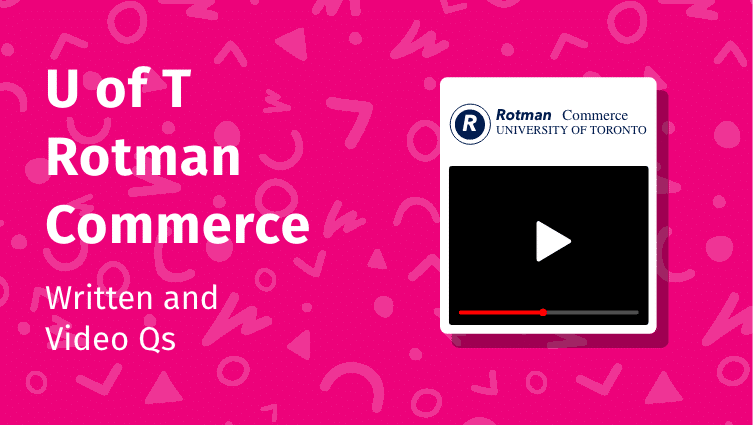
Application Prep
U of T Rotman Commerce: Supplemental Application & Interview Questions Examples 2024/2025
This Application Prep guide is fully updated with this year’s 2024/2025 application (i.e. for applicants planning on starting the program… Read more
2021/2022 UBC Sauder Application: Personal Profile – Question 6
“Please submit the names of two referees who know you well and can comment on your preparedness for study at UBC. Examples of referees include an employer, a community member, a coach, a teacher/instructor, or anyone who knows you well. One of the referees you select MUST be able to speak to one of the activities / experiences described in one of your long-answer responses above. For applicants who are currently attending a high school, one of your referees MUST be a school official (e.g. grade 12 or senior year counsellor, teacher, or IB Coordinator). Neither referee should be a friend, family member, or paid agent.“
UBC Sauder Application: Personal Profile Question 6 – Breakdown
The purpose of this question is so that UBC Sauder can verify the activities, experiences, and learning outcomes you discussed in the previous questions.
Before listing the names and contact information for your references, make sure that you ask your references for permission first, so that if they get a call or email from UBC Sauder then they’re not surprised.
UBC Sauder Application: Personal Profile Question 6 – Template
Get started on your template here (click File > Make a copy and save it to your computer).
You will need the following information:
- First Name
- Last Name
- Relationship
- Email Address
- Phone Number
UBC Sauder Application: Personal Profile Question 6 – Example
Here an example of the information for this section:

UBC Sauder School of Business Program
Now that you’ve created an extraordinary application, we want to show you what your future at UBC Sauder School of Business looks like!
Check out this Day in the Life of a UBC Sauder Student by Jerry, one of Youthfully’s student Insiders. He’ll give you a sneak peek at life as a first year, the UBC campus, application tips, and much more!
You’ve Got a Dedicated Coach in Your Corner
For over a decade, we have worked with thousands of students to help them achieve more than they ever thought possible.
Our coaches have a strong success rate supporting students as they apply to UBC Sauder BCom, among other top university programs.
Our 1-on-1 Youth Coaching fills that gap that most high schools miss. We can help you build self-awareness through probing questions and assessments, set bigger goals to elevate your extracurriculars and future career plans, and improve skills that matter on applications, such as interviewing, written communication, critical thinking, and creativity.
We use a coaching methodology, called ‘full student’ development, that’s been proven to increase your chances of admission to top-tier universities and obtaining competitive jobs/internships.
So, what are you waiting for? Fulfill your post-secondary potential with the mentorship and coaching you’ve always wanted! 🙂
IMPORTANT: Want to share information/images from this resource on your own website, blog, article, etc.? Please ensure you reference content of any kind published by Youthfully Inc., in whole or in part, using the following statement: (1) Our Organization (Youthfully Inc.); (2) The title of our content/resource; and (3) the URL to our webpage where the content was originally posted. For example: “Sourced from: Youthfully Inc., ‘UBC Sauder Application: Personal Profile Examples & Interview Questions 2023/2024,’https://youthfully.com/ubc-sauder-bcom-personal-profile-examples-and-video-interview-questions/.”
Not doing so is an infringement of copyright and is illegal. We spend significant time developing resources for students, so please take a few seconds to ensure they are referenced properly.
DISCLAIMER: While the information in this blog is considered to be true and correct at the date of publication, and although our team makes every attempt to ensure that the information is accurate and vetted by university staff, Youthfully is not in any way liable for the accuracy of any information printed and stored or in any way interpreted and used by a user.
2025 Personal Profile Qs 1-3
2025 Personal Profile Qs 4-6
2025 Personal Profile Qs 7-8
Video Interview
2021/2022 Application
Program
Get 1-on-1 Support

